9/29/2016:
In response to questions about how likely it was that Professor Dunn was duped into becoming the leader of the Eugene KKK in the early 1920’s, I asked Elizabeth Peterson, the cinema studies librarian and film archivist in the UO Libraries, about local showings of “The Birth of a Nation”, the infamously racist and KKK promoting DW Griffith film of 1915. It turns out she knows a lot:
My article about early Eugene and Springfield movie theaters has just been published in the Oregon Historical Quarterly: http://www.jstor.org/stable/10.5403/oregonhistq.117.3.0452. I discuss the local screening of “Birth of a Nation” on p. 459-460:
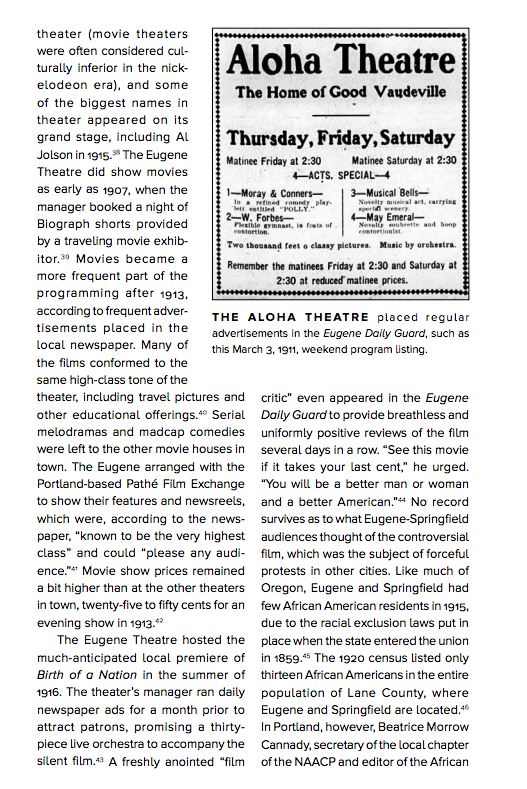
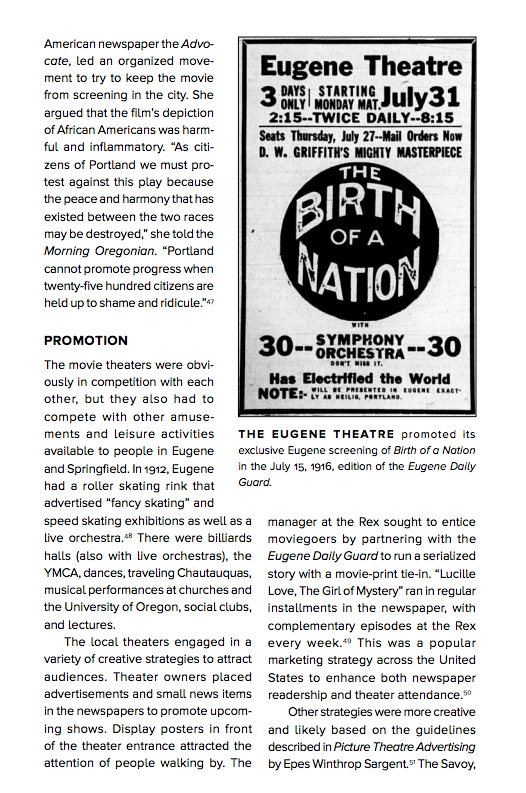
The Eugene Theatre (later the Heilig Theatre) showed the film for three days in the summer of 1916. The Eugene Theatre had a capacity of 760 seats and was in direct competition with three other large movie theaters in Eugene: the Oregon, the Rex, and the Savoy. The Eugene Theatre management ran ads for “Birth of a Nation” for a month in the Eugene Daily Guard leading up to the event. Both the Daily Guard and the Morning Register ran stories about the film’s production (these were likely placed there as PR items), and the Daily Guard’s theater reviewer wrote an enthusiastic piece in praise of the film: https://news.google.com/newspapers?id=fk9XAAAAIBAJ&sjid=FvADAAAAIBAJ&pg=4877%2C1815761.
I wasn’t able to find any other evidence of local reactions to the film, although there was a large outcry against it in Portland, led by Beatrice Morrow Cannady. There is an article in the Oregon Historical Quarterly about that protest (Kimberly Mangun, “‘As Citizens of Portland We Must Protest’: Beatrice Morrow Cannady and the African American Response to D.W. Griffith’s ‘Masterpiece’,” Oregon Historical Quarterly 107:3 (2006): 382-409).
Here is a link to a page from the Eugene Daily Guard that has a half-page ad for the film, and an article just below encouraging people to see the film and which mentions its representations of black people (“Master Picture of Civil War Period is to be Here Monday”) https://news.google.com/newspapers?id=fU9XAAAAIBAJ&sjid=FvADAAAAIBAJ&pg=6066%2C1766027
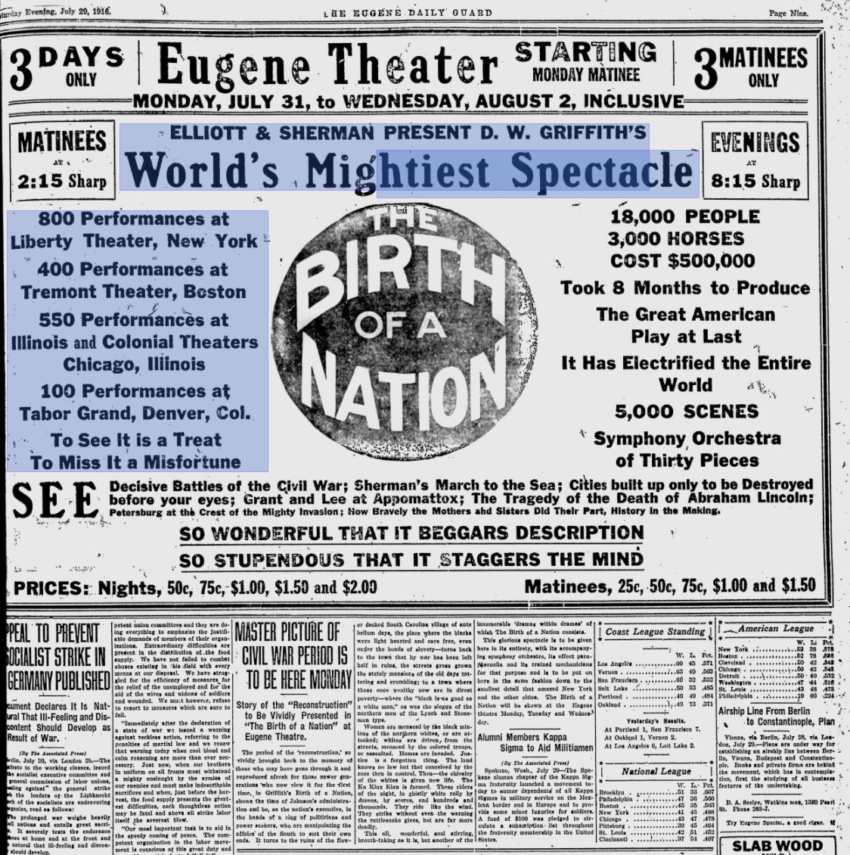
I have also attached two items from the Eugene Morning Register that were published prior to the Eugene screening of the film. One has a tone of praise for the depictions of the Klan, while the other seems to express concern for a resurgence of Klan activity:
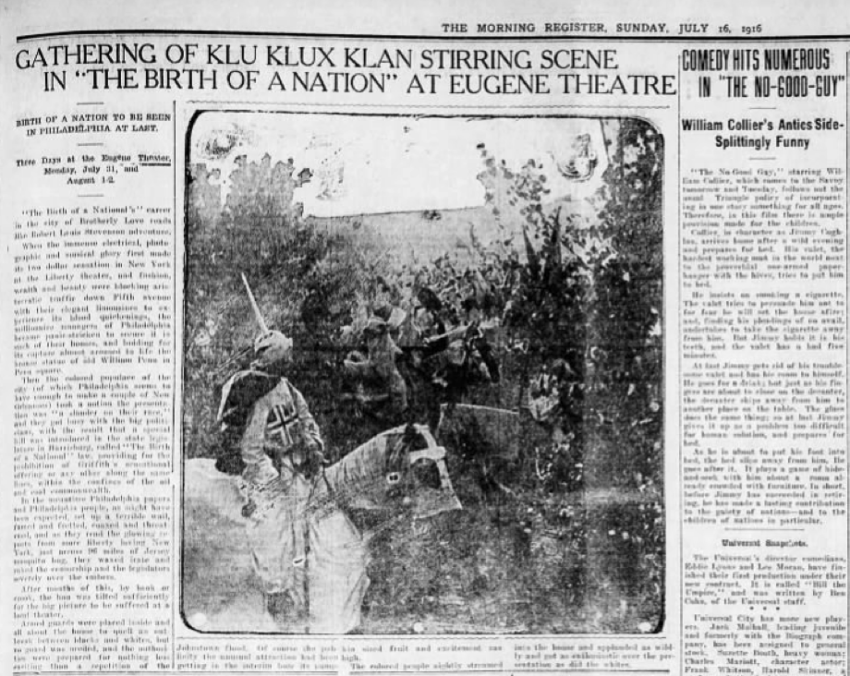
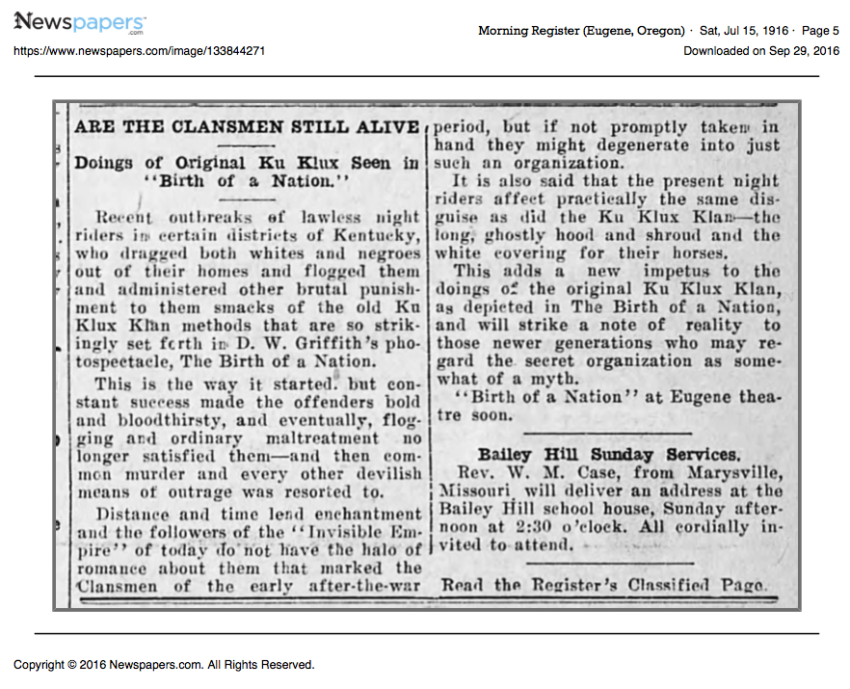
I did a quick search of the Oregon Historical Newspapers database (http://oregonnews.uoregon.edu) and “Birth of a Nation” played all over Oregon in towns of all size during this time.
Whether or not Frederic Dunn saw the film when it played in Eugene, the publicity for it in local media was such that he was likely aware of it and its subject matter.
9/28/2016 Professor Frederick Dunn was not tricked into leading the KKK in Eugene
Earlier this month President Schill recommended denaming Dunn Hall, on the basis of Dunn’s position as Exalted Cyclops of the Eugene KKK chapter during the early 1920’s. The Board of Trustees agreed, despite the arguments of David Igl during the public comment period that Dunn was misled about the true nature of the Klan. At the time I praised Igl for his courage in taking an unpopular stance in defense of a dead man who could not defend himself. The RG has now published his defense of Dunn in an Op-Ed here:
Dunn was tricked into leading KKK in Eugene
Frederick Dunn, a University of Oregon professor of classics, was tricked into accepting the position of exalted cyclops of the Ku Klux Klan in Eugene for what probably amounted to a short period.
Ironically, it was because of the very fact that Dunn was an honorable and moral man of high standing that he was targeted by the Kleagles — the marketing reps for the Georgia-based financial scam that was the Klan fraternal organization — for this position so that they could use his standing in the community as a cover to make themselves appear legitimate.
It’s an interesting argument, read it all. I don’t believe it.
The 1920’s Klan was spawned by the notoriously racist 1915 D.W. Griffith film “Birth of a Nation”. The movie was very popular, and it sparked well publicized protests across the country over its insidious racism and its positive portrayal of the Klan. Here’s the infamous scene of the knights of the Klan riding to protect southern white women from a horde of black union army veterans. Dunn could hardly have been unaware of this controversy, or of the original Klan’s role in lynchings and terrorism against Blacks, or of what it meant to be a leader of the new Klan.
A movie that he may or may not have seen way out in the Oregon of the time is supposed to be evidence of anything?
This is beyond idiocy!
Eugene had movies in 1915, and this was a very controversial film. I’m trying to track down exactly when and where it was shown.
Meanwhile there’s more history below, including the NAACP’s protests, and an endorsement from Princeton’s Woodrow Wilson – who looks worse and worse the more I learn about him:
http://www.pbs.org/wnet/jimcrow/stories_events_birth.html
Let us know what you find.
Maybe you’ll even track down his ticket stub?
I would be interested to know what the local press had to say about the KKK at the time when he was involved.
I have no expertise at all in this, but the RG piece by Igl makes me wonder.
It would be extremely unfortunate if Dunn’s reputation is ruined because of defamation.
Imagine how different the world would be if even half of the energy devoted to defending long-dead white men from accusations of racism were devoted to learning about the historical contributions of women and people of color.
Like.
That statement could easily be reversed to ask about the energy spent making those accusations in the first place. There are statute of limitations for a reason, and one is that the certainty we try to have when making a conviction is very difficult for long-dead people.
Here we have Bill trying to figure out if certain movies were shown in town at certain times and what would be common knowledge or not. I tend to think, “He was in the KKK? Drop him!” but it was interesting to see that other interpretations of that action are possible.
Anyway, I do think there is a certain obligation to expend energy trying to find the truth when an accusation is made. The muddied lens of history may not allow an answer satisfactory to all sides. Was he an evil racist? Possibly. Was he an upstanding citizen misled by the Klan? Possibly. Do we decide to sever all links to people who were possibly bad? We could… after all, they are dead and they don’t care.
Small theaters in Eugene Oregon 1905 – 1915
https://16mmlostandfound.wordpress.com/2014/07/31/tracing-small-town-movie-theaters-in-oregon/
Where does this “obligation” come from? The decision to debate the “historical record” of an individual is conditional on the decision to remember that person the first place. But the process by which we make this prior decision largely excludes women and minorities. By engaging in the conditional conversation, we implicitly reinforce the prior decision.
Our ability to even ask the question “was Dunn a racist?” is a function of his whiteness and maleness. So where is the obligation? To Dunn? To the social conditions that allowed him to succeed? To the history of white men as a class? I just don’t see it.
Without an obligation then what is the alternative? Just undetermined associations being enough to write history to our liking? I don’t see how any structural bias, and I agree it exists, removes this obligation. We could repeat the unfairness of the past, but why is that a good thing? Maybe we should remove the historical beneficiaries of injustice from all the buildings, but that seems like a different conversation than someone saying, “This person should be removed for a specific reason” and someone else saying, “I don’t think that reason is true.”
“Just undetermined associations being enough to write history to our liking?”
Is that any worse than how Dunn got his name on the building in the first place? It’s not as if a committee of historians got together when they slapped his name on there originally. Why is *renaming* held to a different standard than *naming*? The guy used his power and status to get his name on the building, now BLM is attempting to use their power and status to get his name off the building. It seems like a symmetric problem to me, ergo the standard should be the same.
And it’s just a building name. Who cares? There’s no rewriting of history associated with changing a name. We could “dename” the LLC and everyone’s attitudes toward living and learning would remain the same, I bet. And if Dunn’s “historical record” (I still don’t know what that means) is so fragile that removing his name from an edifice is enough to tarnish it, then perhaps he’s not someone worthy of the name in the first place.
“Maybe we should remove the historical beneficiaries of injustice from all the buildings, but that seems like a different conversation than someone saying, “This person should be removed for a specific reason” and someone else saying, “I don’t think that reason is true.””
I agree with this, but it seems like the former strategy is dominated by the latter. Trump would win in a landslide if BLM started demanding we change the name of every building named after a white guy.
I care! he was a good person and my great grandfather!
You are correct. He was a good man. Here is a 53 Page report
that proves Dunn was the victim of bogus history
https://realdunn.blog
David Igl
Sorry Fred, but you know how it works. Ride with the Klan, die with the Klan. You crossed the line. https://youtu.be/DX-PTq-GubE?t=25m1s
Excellent work Elizabeth Peterson – this shows the value of scholars and why Universities, are, in fact,
important.
And this is a useful feature of UOmatters to bring,
otherwise obscure work (I know, I got tenure for
consistent obscure work …) to the light of many